Equitable Action Analysis: Confidentiality and Legal Implications
VerifiedAdded on 2021/06/14
|13
|4007
|22
Report
AI Summary
This report provides an in-depth analysis of equitable action arising from a breach of confidence, focusing on a scenario involving the release of confidential business information and the potential legal ramifications. It examines the jurisdictional basis for equitable action under English law, specifically addressing the infringement of the duty of confidence, the rights of the business owner to civil claims, and the implications for media corporations involved in disseminating the information. The report delves into the three essential principles of breach of confidence: the extent of confidentiality, the duty of confidence, and the public interest disclosure, evaluating how these principles apply to the case at hand. Furthermore, it explores the liability of media news corporations as third parties, considering concepts such as dishonest and innocent third-party liability. Finally, the report outlines potential defenses against claims of breach of confidence for both the media news corps and other parties involved, offering a comprehensive overview of the legal complexities and potential outcomes of the case, including the application of both domestic and equitable laws.
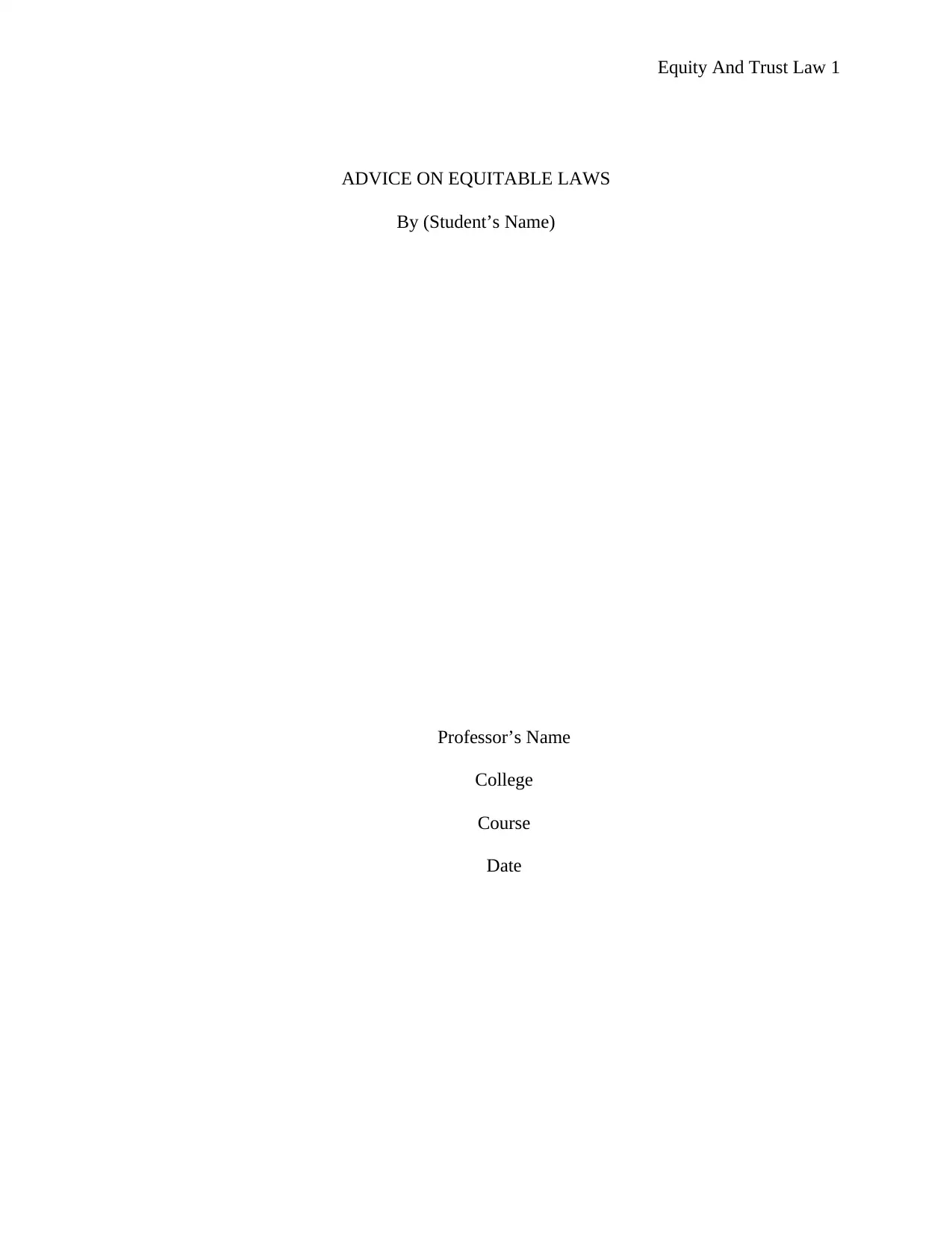
Equity And Trust Law 1
ADVICE ON EQUITABLE LAWS
By (Student’s Name)
Professor’s Name
College
Course
Date
ADVICE ON EQUITABLE LAWS
By (Student’s Name)
Professor’s Name
College
Course
Date
Paraphrase This Document
Need a fresh take? Get an instant paraphrase of this document with our AI Paraphraser
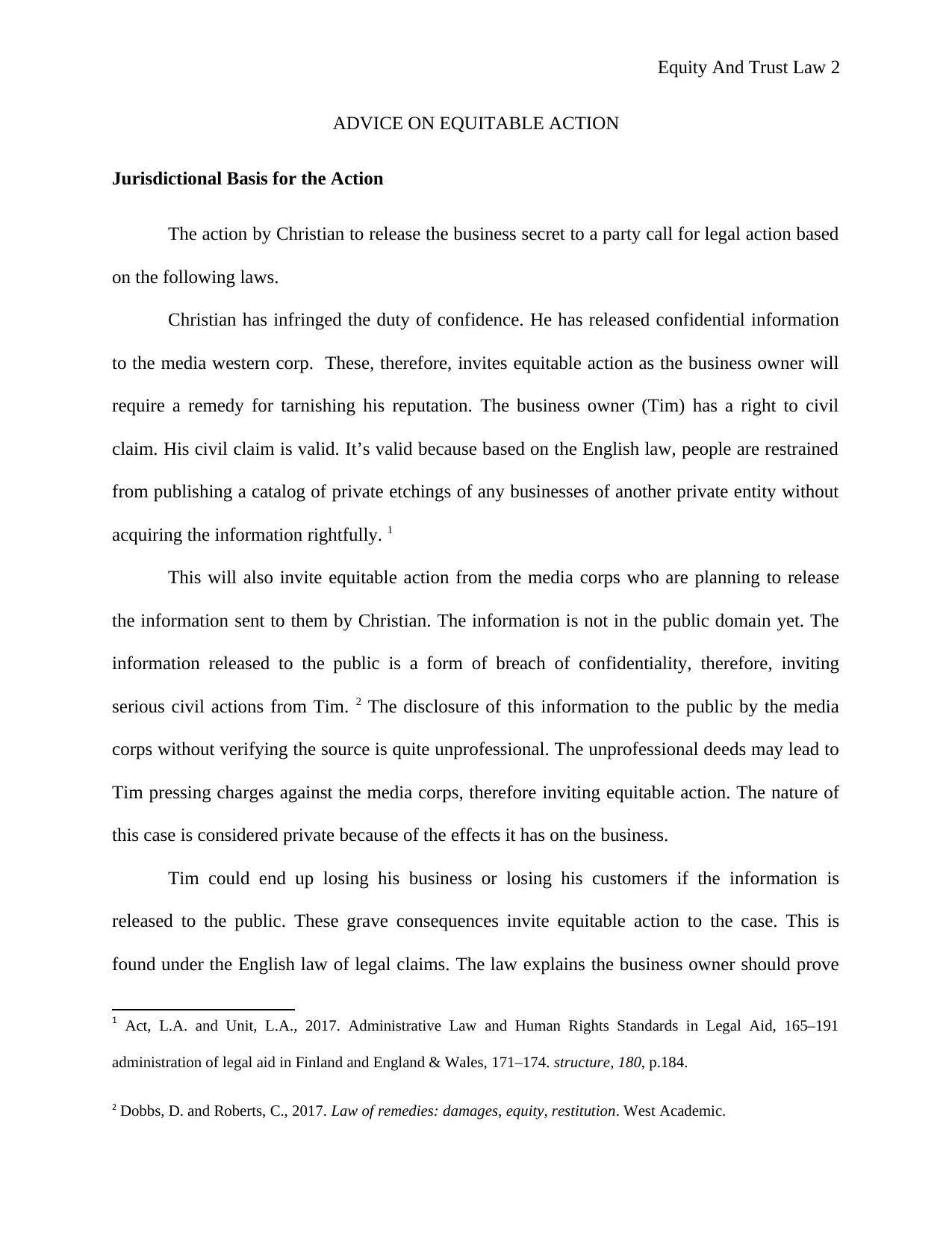
Equity And Trust Law 2
ADVICE ON EQUITABLE ACTION
Jurisdictional Basis for the Action
The action by Christian to release the business secret to a party call for legal action based
on the following laws.
Christian has infringed the duty of confidence. He has released confidential information
to the media western corp. These, therefore, invites equitable action as the business owner will
require a remedy for tarnishing his reputation. The business owner (Tim) has a right to civil
claim. His civil claim is valid. It’s valid because based on the English law, people are restrained
from publishing a catalog of private etchings of any businesses of another private entity without
acquiring the information rightfully. 1
This will also invite equitable action from the media corps who are planning to release
the information sent to them by Christian. The information is not in the public domain yet. The
information released to the public is a form of breach of confidentiality, therefore, inviting
serious civil actions from Tim. 2 The disclosure of this information to the public by the media
corps without verifying the source is quite unprofessional. The unprofessional deeds may lead to
Tim pressing charges against the media corps, therefore inviting equitable action. The nature of
this case is considered private because of the effects it has on the business.
Tim could end up losing his business or losing his customers if the information is
released to the public. These grave consequences invite equitable action to the case. This is
found under the English law of legal claims. The law explains the business owner should prove
1 Act, L.A. and Unit, L.A., 2017. Administrative Law and Human Rights Standards in Legal Aid, 165–191
administration of legal aid in Finland and England & Wales, 171–174. structure, 180, p.184.
2 Dobbs, D. and Roberts, C., 2017. Law of remedies: damages, equity, restitution. West Academic.
ADVICE ON EQUITABLE ACTION
Jurisdictional Basis for the Action
The action by Christian to release the business secret to a party call for legal action based
on the following laws.
Christian has infringed the duty of confidence. He has released confidential information
to the media western corp. These, therefore, invites equitable action as the business owner will
require a remedy for tarnishing his reputation. The business owner (Tim) has a right to civil
claim. His civil claim is valid. It’s valid because based on the English law, people are restrained
from publishing a catalog of private etchings of any businesses of another private entity without
acquiring the information rightfully. 1
This will also invite equitable action from the media corps who are planning to release
the information sent to them by Christian. The information is not in the public domain yet. The
information released to the public is a form of breach of confidentiality, therefore, inviting
serious civil actions from Tim. 2 The disclosure of this information to the public by the media
corps without verifying the source is quite unprofessional. The unprofessional deeds may lead to
Tim pressing charges against the media corps, therefore inviting equitable action. The nature of
this case is considered private because of the effects it has on the business.
Tim could end up losing his business or losing his customers if the information is
released to the public. These grave consequences invite equitable action to the case. This is
found under the English law of legal claims. The law explains the business owner should prove
1 Act, L.A. and Unit, L.A., 2017. Administrative Law and Human Rights Standards in Legal Aid, 165–191
administration of legal aid in Finland and England & Wales, 171–174. structure, 180, p.184.
2 Dobbs, D. and Roberts, C., 2017. Law of remedies: damages, equity, restitution. West Academic.
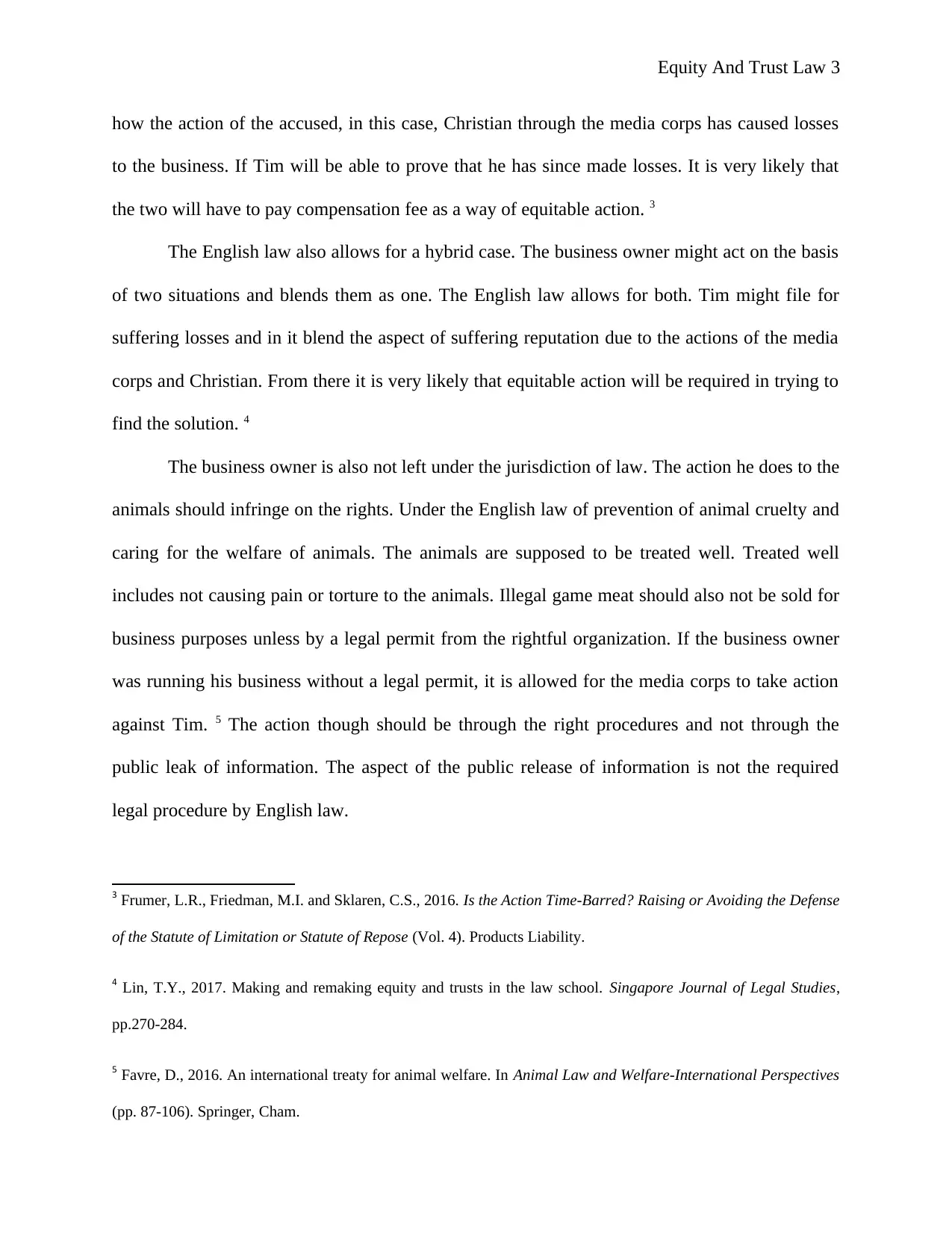
Equity And Trust Law 3
how the action of the accused, in this case, Christian through the media corps has caused losses
to the business. If Tim will be able to prove that he has since made losses. It is very likely that
the two will have to pay compensation fee as a way of equitable action. 3
The English law also allows for a hybrid case. The business owner might act on the basis
of two situations and blends them as one. The English law allows for both. Tim might file for
suffering losses and in it blend the aspect of suffering reputation due to the actions of the media
corps and Christian. From there it is very likely that equitable action will be required in trying to
find the solution. 4
The business owner is also not left under the jurisdiction of law. The action he does to the
animals should infringe on the rights. Under the English law of prevention of animal cruelty and
caring for the welfare of animals. The animals are supposed to be treated well. Treated well
includes not causing pain or torture to the animals. Illegal game meat should also not be sold for
business purposes unless by a legal permit from the rightful organization. If the business owner
was running his business without a legal permit, it is allowed for the media corps to take action
against Tim. 5 The action though should be through the right procedures and not through the
public leak of information. The aspect of the public release of information is not the required
legal procedure by English law.
3 Frumer, L.R., Friedman, M.I. and Sklaren, C.S., 2016. Is the Action Time-Barred? Raising or Avoiding the Defense
of the Statute of Limitation or Statute of Repose (Vol. 4). Products Liability.
4 Lin, T.Y., 2017. Making and remaking equity and trusts in the law school. Singapore Journal of Legal Studies,
pp.270-284.
5 Favre, D., 2016. An international treaty for animal welfare. In Animal Law and Welfare-International Perspectives
(pp. 87-106). Springer, Cham.
how the action of the accused, in this case, Christian through the media corps has caused losses
to the business. If Tim will be able to prove that he has since made losses. It is very likely that
the two will have to pay compensation fee as a way of equitable action. 3
The English law also allows for a hybrid case. The business owner might act on the basis
of two situations and blends them as one. The English law allows for both. Tim might file for
suffering losses and in it blend the aspect of suffering reputation due to the actions of the media
corps and Christian. From there it is very likely that equitable action will be required in trying to
find the solution. 4
The business owner is also not left under the jurisdiction of law. The action he does to the
animals should infringe on the rights. Under the English law of prevention of animal cruelty and
caring for the welfare of animals. The animals are supposed to be treated well. Treated well
includes not causing pain or torture to the animals. Illegal game meat should also not be sold for
business purposes unless by a legal permit from the rightful organization. If the business owner
was running his business without a legal permit, it is allowed for the media corps to take action
against Tim. 5 The action though should be through the right procedures and not through the
public leak of information. The aspect of the public release of information is not the required
legal procedure by English law.
3 Frumer, L.R., Friedman, M.I. and Sklaren, C.S., 2016. Is the Action Time-Barred? Raising or Avoiding the Defense
of the Statute of Limitation or Statute of Repose (Vol. 4). Products Liability.
4 Lin, T.Y., 2017. Making and remaking equity and trusts in the law school. Singapore Journal of Legal Studies,
pp.270-284.
5 Favre, D., 2016. An international treaty for animal welfare. In Animal Law and Welfare-International Perspectives
(pp. 87-106). Springer, Cham.
⊘ This is a preview!⊘
Do you want full access?
Subscribe today to unlock all pages.

Trusted by 1+ million students worldwide
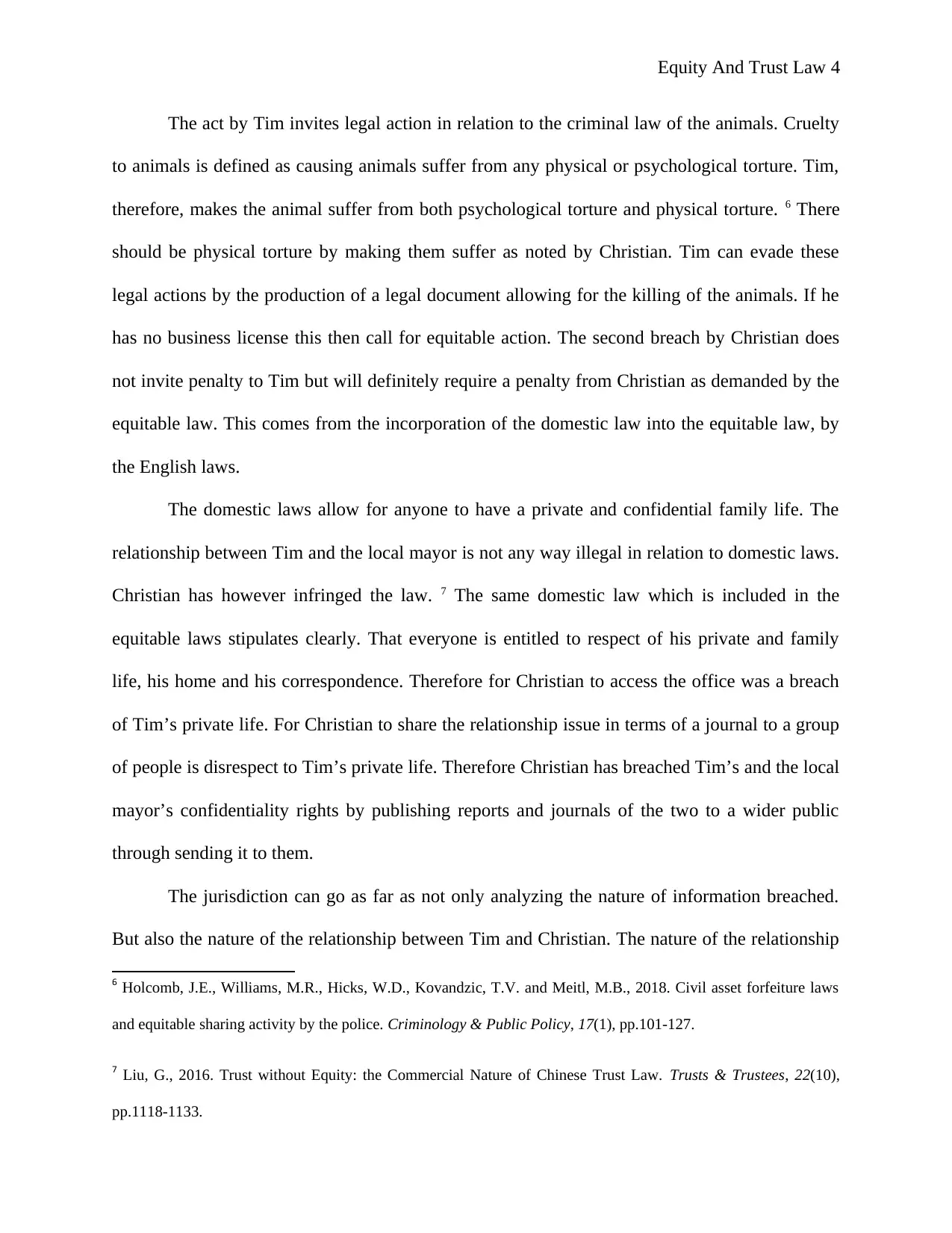
Equity And Trust Law 4
The act by Tim invites legal action in relation to the criminal law of the animals. Cruelty
to animals is defined as causing animals suffer from any physical or psychological torture. Tim,
therefore, makes the animal suffer from both psychological torture and physical torture. 6 There
should be physical torture by making them suffer as noted by Christian. Tim can evade these
legal actions by the production of a legal document allowing for the killing of the animals. If he
has no business license this then call for equitable action. The second breach by Christian does
not invite penalty to Tim but will definitely require a penalty from Christian as demanded by the
equitable law. This comes from the incorporation of the domestic law into the equitable law, by
the English laws.
The domestic laws allow for anyone to have a private and confidential family life. The
relationship between Tim and the local mayor is not any way illegal in relation to domestic laws.
Christian has however infringed the law. 7 The same domestic law which is included in the
equitable laws stipulates clearly. That everyone is entitled to respect of his private and family
life, his home and his correspondence. Therefore for Christian to access the office was a breach
of Tim’s private life. For Christian to share the relationship issue in terms of a journal to a group
of people is disrespect to Tim’s private life. Therefore Christian has breached Tim’s and the local
mayor’s confidentiality rights by publishing reports and journals of the two to a wider public
through sending it to them.
The jurisdiction can go as far as not only analyzing the nature of information breached.
But also the nature of the relationship between Tim and Christian. The nature of the relationship
6 Holcomb, J.E., Williams, M.R., Hicks, W.D., Kovandzic, T.V. and Meitl, M.B., 2018. Civil asset forfeiture laws
and equitable sharing activity by the police. Criminology & Public Policy, 17(1), pp.101-127.
7 Liu, G., 2016. Trust without Equity: the Commercial Nature of Chinese Trust Law. Trusts & Trustees, 22(10),
pp.1118-1133.
The act by Tim invites legal action in relation to the criminal law of the animals. Cruelty
to animals is defined as causing animals suffer from any physical or psychological torture. Tim,
therefore, makes the animal suffer from both psychological torture and physical torture. 6 There
should be physical torture by making them suffer as noted by Christian. Tim can evade these
legal actions by the production of a legal document allowing for the killing of the animals. If he
has no business license this then call for equitable action. The second breach by Christian does
not invite penalty to Tim but will definitely require a penalty from Christian as demanded by the
equitable law. This comes from the incorporation of the domestic law into the equitable law, by
the English laws.
The domestic laws allow for anyone to have a private and confidential family life. The
relationship between Tim and the local mayor is not any way illegal in relation to domestic laws.
Christian has however infringed the law. 7 The same domestic law which is included in the
equitable laws stipulates clearly. That everyone is entitled to respect of his private and family
life, his home and his correspondence. Therefore for Christian to access the office was a breach
of Tim’s private life. For Christian to share the relationship issue in terms of a journal to a group
of people is disrespect to Tim’s private life. Therefore Christian has breached Tim’s and the local
mayor’s confidentiality rights by publishing reports and journals of the two to a wider public
through sending it to them.
The jurisdiction can go as far as not only analyzing the nature of information breached.
But also the nature of the relationship between Tim and Christian. The nature of the relationship
6 Holcomb, J.E., Williams, M.R., Hicks, W.D., Kovandzic, T.V. and Meitl, M.B., 2018. Civil asset forfeiture laws
and equitable sharing activity by the police. Criminology & Public Policy, 17(1), pp.101-127.
7 Liu, G., 2016. Trust without Equity: the Commercial Nature of Chinese Trust Law. Trusts & Trustees, 22(10),
pp.1118-1133.
Paraphrase This Document
Need a fresh take? Get an instant paraphrase of this document with our AI Paraphraser
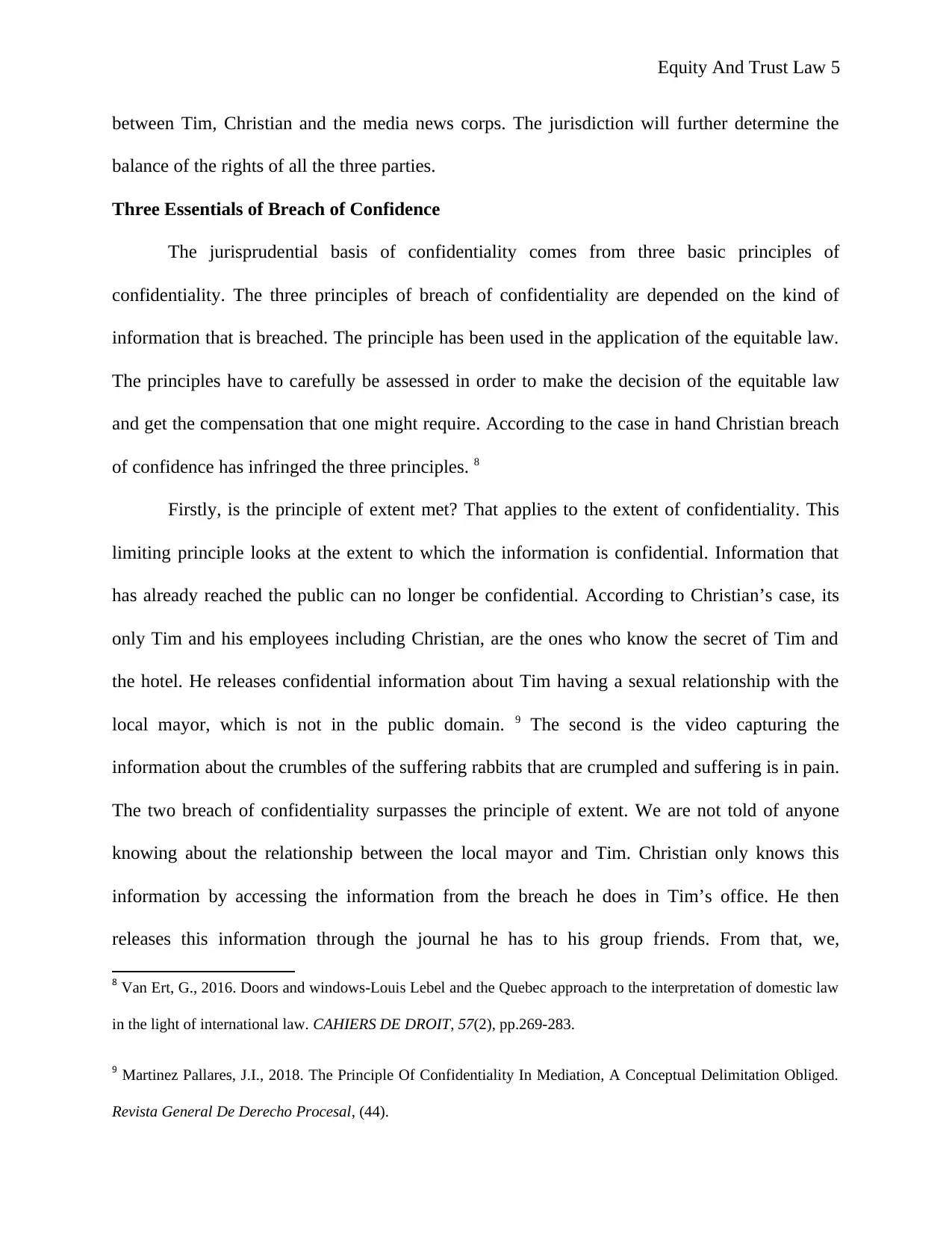
Equity And Trust Law 5
between Tim, Christian and the media news corps. The jurisdiction will further determine the
balance of the rights of all the three parties.
Three Essentials of Breach of Confidence
The jurisprudential basis of confidentiality comes from three basic principles of
confidentiality. The three principles of breach of confidentiality are depended on the kind of
information that is breached. The principle has been used in the application of the equitable law.
The principles have to carefully be assessed in order to make the decision of the equitable law
and get the compensation that one might require. According to the case in hand Christian breach
of confidence has infringed the three principles. 8
Firstly, is the principle of extent met? That applies to the extent of confidentiality. This
limiting principle looks at the extent to which the information is confidential. Information that
has already reached the public can no longer be confidential. According to Christian’s case, its
only Tim and his employees including Christian, are the ones who know the secret of Tim and
the hotel. He releases confidential information about Tim having a sexual relationship with the
local mayor, which is not in the public domain. 9 The second is the video capturing the
information about the crumbles of the suffering rabbits that are crumpled and suffering is in pain.
The two breach of confidentiality surpasses the principle of extent. We are not told of anyone
knowing about the relationship between the local mayor and Tim. Christian only knows this
information by accessing the information from the breach he does in Tim’s office. He then
releases this information through the journal he has to his group friends. From that, we,
8 Van Ert, G., 2016. Doors and windows-Louis Lebel and the Quebec approach to the interpretation of domestic law
in the light of international law. CAHIERS DE DROIT, 57(2), pp.269-283.
9 Martinez Pallares, J.I., 2018. The Principle Of Confidentiality In Mediation, A Conceptual Delimitation Obliged.
Revista General De Derecho Procesal, (44).
between Tim, Christian and the media news corps. The jurisdiction will further determine the
balance of the rights of all the three parties.
Three Essentials of Breach of Confidence
The jurisprudential basis of confidentiality comes from three basic principles of
confidentiality. The three principles of breach of confidentiality are depended on the kind of
information that is breached. The principle has been used in the application of the equitable law.
The principles have to carefully be assessed in order to make the decision of the equitable law
and get the compensation that one might require. According to the case in hand Christian breach
of confidence has infringed the three principles. 8
Firstly, is the principle of extent met? That applies to the extent of confidentiality. This
limiting principle looks at the extent to which the information is confidential. Information that
has already reached the public can no longer be confidential. According to Christian’s case, its
only Tim and his employees including Christian, are the ones who know the secret of Tim and
the hotel. He releases confidential information about Tim having a sexual relationship with the
local mayor, which is not in the public domain. 9 The second is the video capturing the
information about the crumbles of the suffering rabbits that are crumpled and suffering is in pain.
The two breach of confidentiality surpasses the principle of extent. We are not told of anyone
knowing about the relationship between the local mayor and Tim. Christian only knows this
information by accessing the information from the breach he does in Tim’s office. He then
releases this information through the journal he has to his group friends. From that, we,
8 Van Ert, G., 2016. Doors and windows-Louis Lebel and the Quebec approach to the interpretation of domestic law
in the light of international law. CAHIERS DE DROIT, 57(2), pp.269-283.
9 Martinez Pallares, J.I., 2018. The Principle Of Confidentiality In Mediation, A Conceptual Delimitation Obliged.
Revista General De Derecho Procesal, (44).
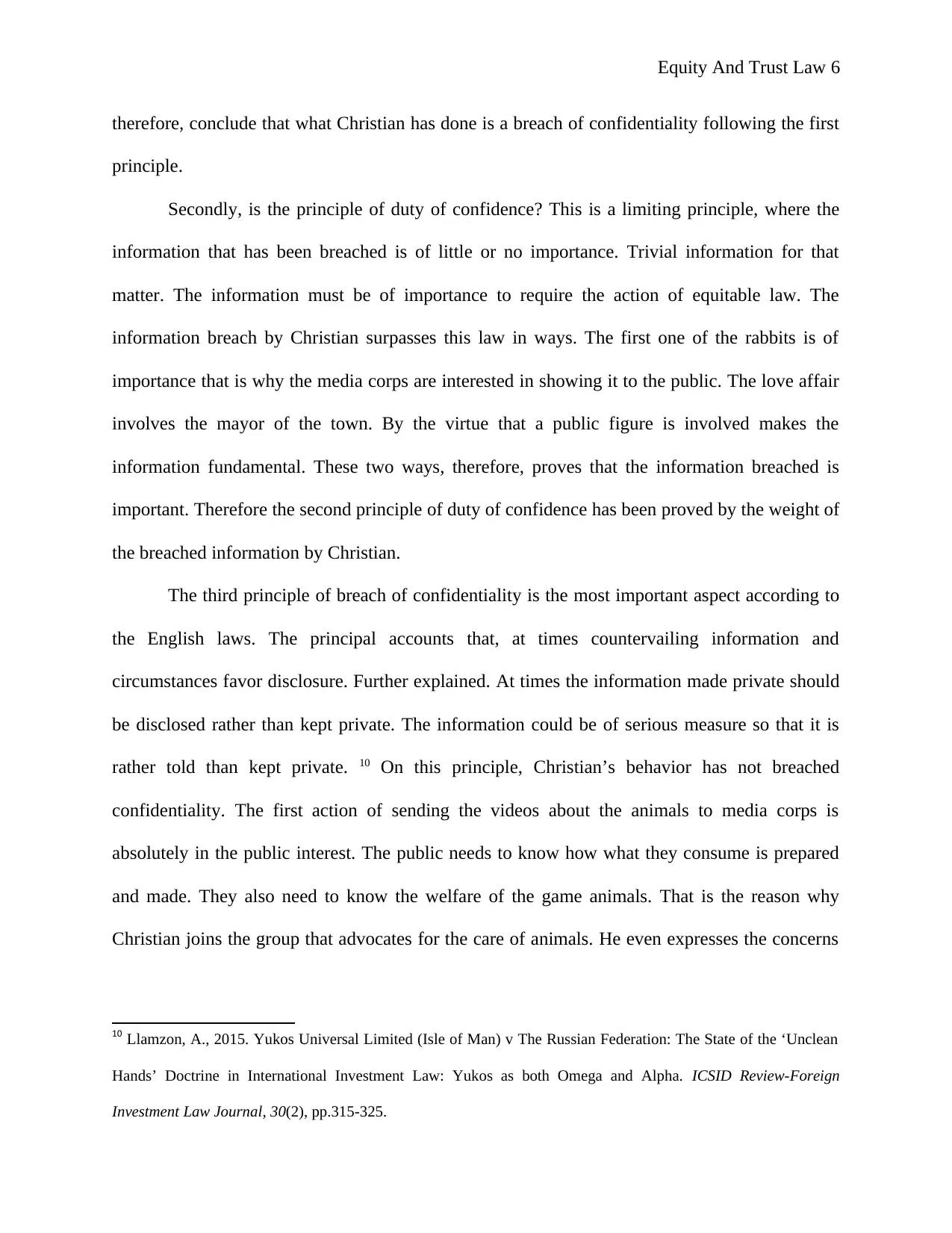
Equity And Trust Law 6
therefore, conclude that what Christian has done is a breach of confidentiality following the first
principle.
Secondly, is the principle of duty of confidence? This is a limiting principle, where the
information that has been breached is of little or no importance. Trivial information for that
matter. The information must be of importance to require the action of equitable law. The
information breach by Christian surpasses this law in ways. The first one of the rabbits is of
importance that is why the media corps are interested in showing it to the public. The love affair
involves the mayor of the town. By the virtue that a public figure is involved makes the
information fundamental. These two ways, therefore, proves that the information breached is
important. Therefore the second principle of duty of confidence has been proved by the weight of
the breached information by Christian.
The third principle of breach of confidentiality is the most important aspect according to
the English laws. The principal accounts that, at times countervailing information and
circumstances favor disclosure. Further explained. At times the information made private should
be disclosed rather than kept private. The information could be of serious measure so that it is
rather told than kept private. 10 On this principle, Christian’s behavior has not breached
confidentiality. The first action of sending the videos about the animals to media corps is
absolutely in the public interest. The public needs to know how what they consume is prepared
and made. They also need to know the welfare of the game animals. That is the reason why
Christian joins the group that advocates for the care of animals. He even expresses the concerns
10 Llamzon, A., 2015. Yukos Universal Limited (Isle of Man) v The Russian Federation: The State of the ‘Unclean
Hands’ Doctrine in International Investment Law: Yukos as both Omega and Alpha. ICSID Review-Foreign
Investment Law Journal, 30(2), pp.315-325.
therefore, conclude that what Christian has done is a breach of confidentiality following the first
principle.
Secondly, is the principle of duty of confidence? This is a limiting principle, where the
information that has been breached is of little or no importance. Trivial information for that
matter. The information must be of importance to require the action of equitable law. The
information breach by Christian surpasses this law in ways. The first one of the rabbits is of
importance that is why the media corps are interested in showing it to the public. The love affair
involves the mayor of the town. By the virtue that a public figure is involved makes the
information fundamental. These two ways, therefore, proves that the information breached is
important. Therefore the second principle of duty of confidence has been proved by the weight of
the breached information by Christian.
The third principle of breach of confidentiality is the most important aspect according to
the English laws. The principal accounts that, at times countervailing information and
circumstances favor disclosure. Further explained. At times the information made private should
be disclosed rather than kept private. The information could be of serious measure so that it is
rather told than kept private. 10 On this principle, Christian’s behavior has not breached
confidentiality. The first action of sending the videos about the animals to media corps is
absolutely in the public interest. The public needs to know how what they consume is prepared
and made. They also need to know the welfare of the game animals. That is the reason why
Christian joins the group that advocates for the care of animals. He even expresses the concerns
10 Llamzon, A., 2015. Yukos Universal Limited (Isle of Man) v The Russian Federation: The State of the ‘Unclean
Hands’ Doctrine in International Investment Law: Yukos as both Omega and Alpha. ICSID Review-Foreign
Investment Law Journal, 30(2), pp.315-325.
⊘ This is a preview!⊘
Do you want full access?
Subscribe today to unlock all pages.

Trusted by 1+ million students worldwide
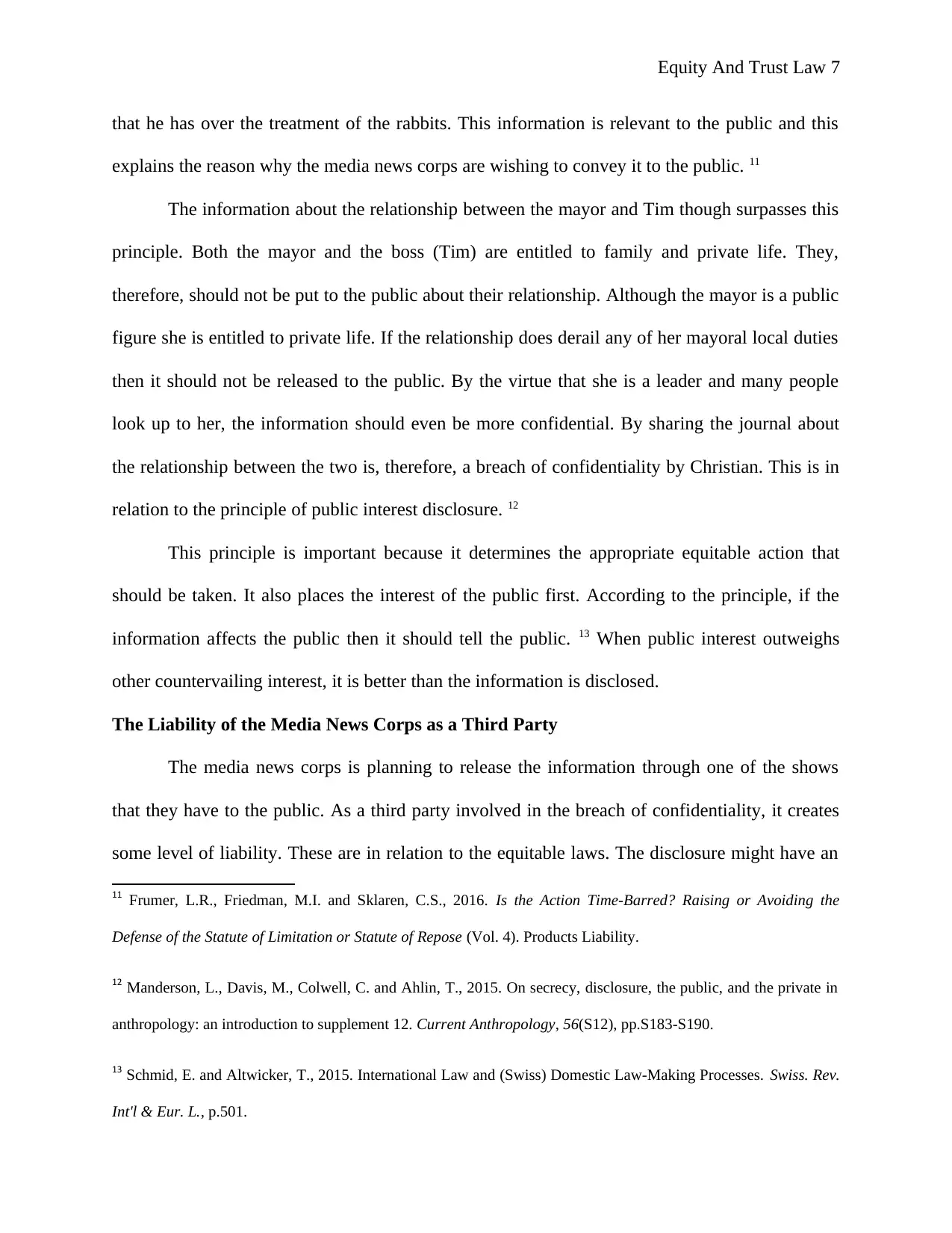
Equity And Trust Law 7
that he has over the treatment of the rabbits. This information is relevant to the public and this
explains the reason why the media news corps are wishing to convey it to the public. 11
The information about the relationship between the mayor and Tim though surpasses this
principle. Both the mayor and the boss (Tim) are entitled to family and private life. They,
therefore, should not be put to the public about their relationship. Although the mayor is a public
figure she is entitled to private life. If the relationship does derail any of her mayoral local duties
then it should not be released to the public. By the virtue that she is a leader and many people
look up to her, the information should even be more confidential. By sharing the journal about
the relationship between the two is, therefore, a breach of confidentiality by Christian. This is in
relation to the principle of public interest disclosure. 12
This principle is important because it determines the appropriate equitable action that
should be taken. It also places the interest of the public first. According to the principle, if the
information affects the public then it should tell the public. 13 When public interest outweighs
other countervailing interest, it is better than the information is disclosed.
The Liability of the Media News Corps as a Third Party
The media news corps is planning to release the information through one of the shows
that they have to the public. As a third party involved in the breach of confidentiality, it creates
some level of liability. These are in relation to the equitable laws. The disclosure might have an
11 Frumer, L.R., Friedman, M.I. and Sklaren, C.S., 2016. Is the Action Time-Barred? Raising or Avoiding the
Defense of the Statute of Limitation or Statute of Repose (Vol. 4). Products Liability.
12 Manderson, L., Davis, M., Colwell, C. and Ahlin, T., 2015. On secrecy, disclosure, the public, and the private in
anthropology: an introduction to supplement 12. Current Anthropology, 56(S12), pp.S183-S190.
13 Schmid, E. and Altwicker, T., 2015. International Law and (Swiss) Domestic Law-Making Processes. Swiss. Rev.
Int'l & Eur. L., p.501.
that he has over the treatment of the rabbits. This information is relevant to the public and this
explains the reason why the media news corps are wishing to convey it to the public. 11
The information about the relationship between the mayor and Tim though surpasses this
principle. Both the mayor and the boss (Tim) are entitled to family and private life. They,
therefore, should not be put to the public about their relationship. Although the mayor is a public
figure she is entitled to private life. If the relationship does derail any of her mayoral local duties
then it should not be released to the public. By the virtue that she is a leader and many people
look up to her, the information should even be more confidential. By sharing the journal about
the relationship between the two is, therefore, a breach of confidentiality by Christian. This is in
relation to the principle of public interest disclosure. 12
This principle is important because it determines the appropriate equitable action that
should be taken. It also places the interest of the public first. According to the principle, if the
information affects the public then it should tell the public. 13 When public interest outweighs
other countervailing interest, it is better than the information is disclosed.
The Liability of the Media News Corps as a Third Party
The media news corps is planning to release the information through one of the shows
that they have to the public. As a third party involved in the breach of confidentiality, it creates
some level of liability. These are in relation to the equitable laws. The disclosure might have an
11 Frumer, L.R., Friedman, M.I. and Sklaren, C.S., 2016. Is the Action Time-Barred? Raising or Avoiding the
Defense of the Statute of Limitation or Statute of Repose (Vol. 4). Products Liability.
12 Manderson, L., Davis, M., Colwell, C. and Ahlin, T., 2015. On secrecy, disclosure, the public, and the private in
anthropology: an introduction to supplement 12. Current Anthropology, 56(S12), pp.S183-S190.
13 Schmid, E. and Altwicker, T., 2015. International Law and (Swiss) Domestic Law-Making Processes. Swiss. Rev.
Int'l & Eur. L., p.501.
Paraphrase This Document
Need a fresh take? Get an instant paraphrase of this document with our AI Paraphraser
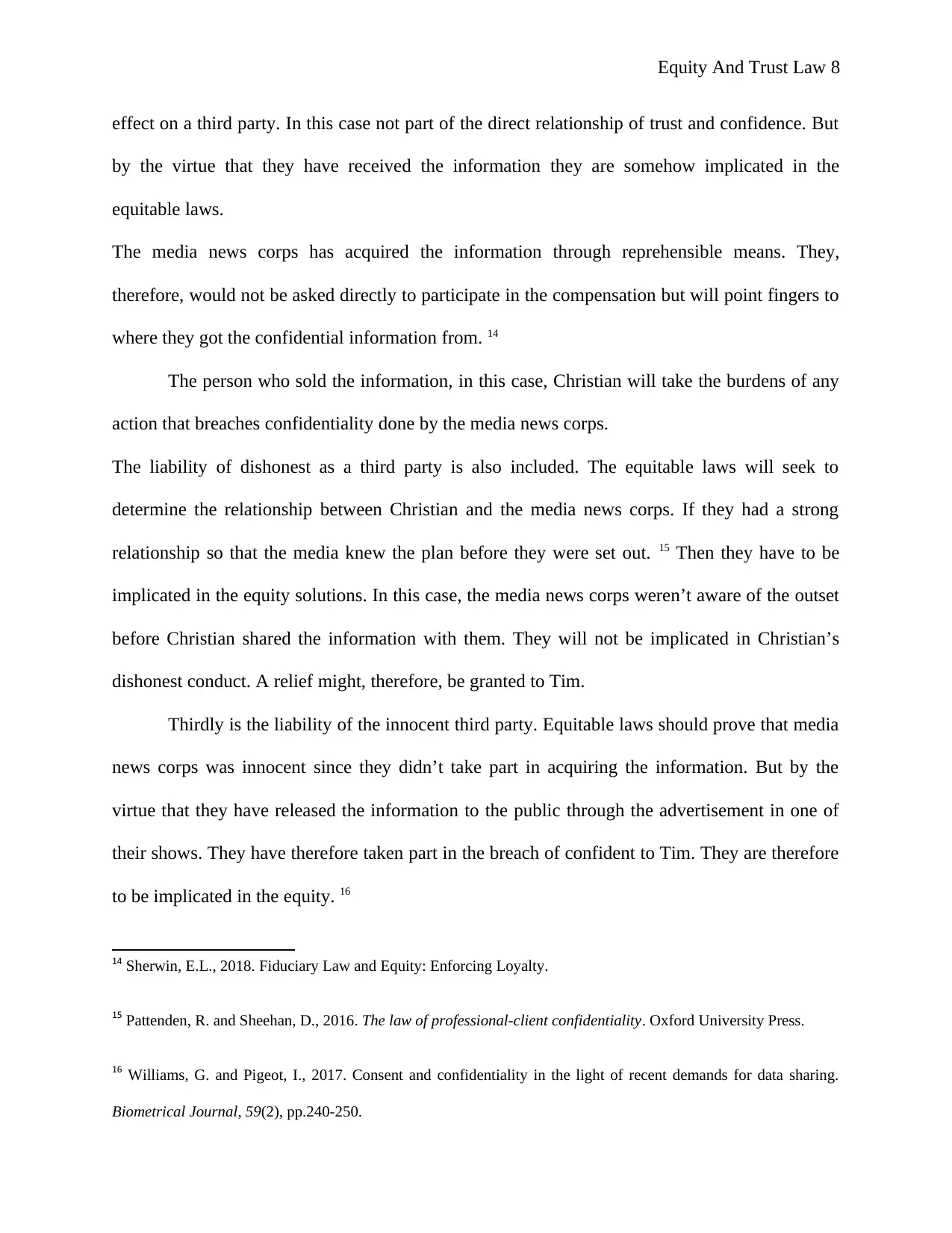
Equity And Trust Law 8
effect on a third party. In this case not part of the direct relationship of trust and confidence. But
by the virtue that they have received the information they are somehow implicated in the
equitable laws.
The media news corps has acquired the information through reprehensible means. They,
therefore, would not be asked directly to participate in the compensation but will point fingers to
where they got the confidential information from. 14
The person who sold the information, in this case, Christian will take the burdens of any
action that breaches confidentiality done by the media news corps.
The liability of dishonest as a third party is also included. The equitable laws will seek to
determine the relationship between Christian and the media news corps. If they had a strong
relationship so that the media knew the plan before they were set out. 15 Then they have to be
implicated in the equity solutions. In this case, the media news corps weren’t aware of the outset
before Christian shared the information with them. They will not be implicated in Christian’s
dishonest conduct. A relief might, therefore, be granted to Tim.
Thirdly is the liability of the innocent third party. Equitable laws should prove that media
news corps was innocent since they didn’t take part in acquiring the information. But by the
virtue that they have released the information to the public through the advertisement in one of
their shows. They have therefore taken part in the breach of confident to Tim. They are therefore
to be implicated in the equity. 16
14 Sherwin, E.L., 2018. Fiduciary Law and Equity: Enforcing Loyalty.
15 Pattenden, R. and Sheehan, D., 2016. The law of professional-client confidentiality. Oxford University Press.
16 Williams, G. and Pigeot, I., 2017. Consent and confidentiality in the light of recent demands for data sharing.
Biometrical Journal, 59(2), pp.240-250.
effect on a third party. In this case not part of the direct relationship of trust and confidence. But
by the virtue that they have received the information they are somehow implicated in the
equitable laws.
The media news corps has acquired the information through reprehensible means. They,
therefore, would not be asked directly to participate in the compensation but will point fingers to
where they got the confidential information from. 14
The person who sold the information, in this case, Christian will take the burdens of any
action that breaches confidentiality done by the media news corps.
The liability of dishonest as a third party is also included. The equitable laws will seek to
determine the relationship between Christian and the media news corps. If they had a strong
relationship so that the media knew the plan before they were set out. 15 Then they have to be
implicated in the equity solutions. In this case, the media news corps weren’t aware of the outset
before Christian shared the information with them. They will not be implicated in Christian’s
dishonest conduct. A relief might, therefore, be granted to Tim.
Thirdly is the liability of the innocent third party. Equitable laws should prove that media
news corps was innocent since they didn’t take part in acquiring the information. But by the
virtue that they have released the information to the public through the advertisement in one of
their shows. They have therefore taken part in the breach of confident to Tim. They are therefore
to be implicated in the equity. 16
14 Sherwin, E.L., 2018. Fiduciary Law and Equity: Enforcing Loyalty.
15 Pattenden, R. and Sheehan, D., 2016. The law of professional-client confidentiality. Oxford University Press.
16 Williams, G. and Pigeot, I., 2017. Consent and confidentiality in the light of recent demands for data sharing.
Biometrical Journal, 59(2), pp.240-250.
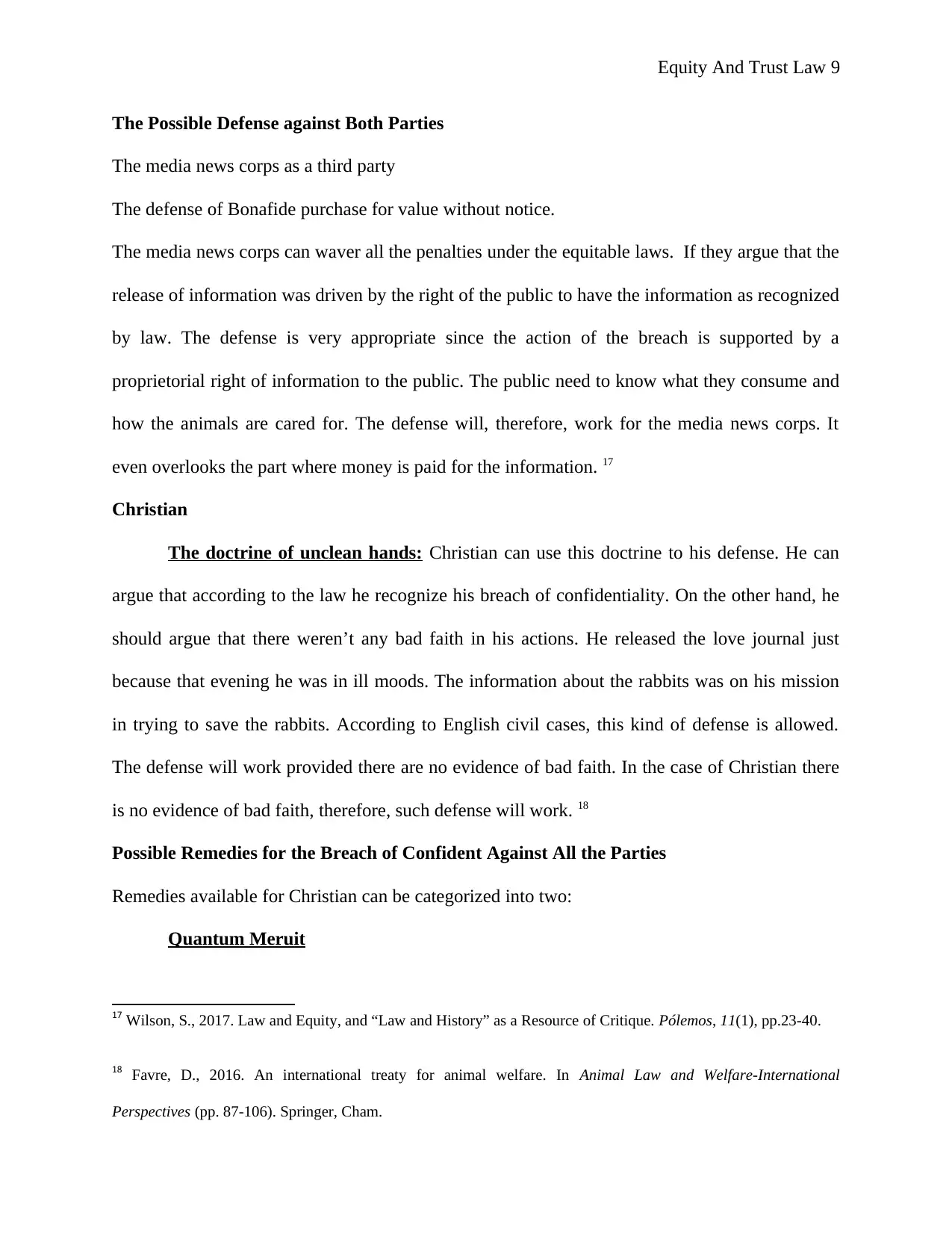
Equity And Trust Law 9
The Possible Defense against Both Parties
The media news corps as a third party
The defense of Bonafide purchase for value without notice.
The media news corps can waver all the penalties under the equitable laws. If they argue that the
release of information was driven by the right of the public to have the information as recognized
by law. The defense is very appropriate since the action of the breach is supported by a
proprietorial right of information to the public. The public need to know what they consume and
how the animals are cared for. The defense will, therefore, work for the media news corps. It
even overlooks the part where money is paid for the information. 17
Christian
The doctrine of unclean hands: Christian can use this doctrine to his defense. He can
argue that according to the law he recognize his breach of confidentiality. On the other hand, he
should argue that there weren’t any bad faith in his actions. He released the love journal just
because that evening he was in ill moods. The information about the rabbits was on his mission
in trying to save the rabbits. According to English civil cases, this kind of defense is allowed.
The defense will work provided there are no evidence of bad faith. In the case of Christian there
is no evidence of bad faith, therefore, such defense will work. 18
Possible Remedies for the Breach of Confident Against All the Parties
Remedies available for Christian can be categorized into two:
Quantum Meruit
17 Wilson, S., 2017. Law and Equity, and “Law and History” as a Resource of Critique. Pólemos, 11(1), pp.23-40.
18 Favre, D., 2016. An international treaty for animal welfare. In Animal Law and Welfare-International
Perspectives (pp. 87-106). Springer, Cham.
The Possible Defense against Both Parties
The media news corps as a third party
The defense of Bonafide purchase for value without notice.
The media news corps can waver all the penalties under the equitable laws. If they argue that the
release of information was driven by the right of the public to have the information as recognized
by law. The defense is very appropriate since the action of the breach is supported by a
proprietorial right of information to the public. The public need to know what they consume and
how the animals are cared for. The defense will, therefore, work for the media news corps. It
even overlooks the part where money is paid for the information. 17
Christian
The doctrine of unclean hands: Christian can use this doctrine to his defense. He can
argue that according to the law he recognize his breach of confidentiality. On the other hand, he
should argue that there weren’t any bad faith in his actions. He released the love journal just
because that evening he was in ill moods. The information about the rabbits was on his mission
in trying to save the rabbits. According to English civil cases, this kind of defense is allowed.
The defense will work provided there are no evidence of bad faith. In the case of Christian there
is no evidence of bad faith, therefore, such defense will work. 18
Possible Remedies for the Breach of Confident Against All the Parties
Remedies available for Christian can be categorized into two:
Quantum Meruit
17 Wilson, S., 2017. Law and Equity, and “Law and History” as a Resource of Critique. Pólemos, 11(1), pp.23-40.
18 Favre, D., 2016. An international treaty for animal welfare. In Animal Law and Welfare-International
Perspectives (pp. 87-106). Springer, Cham.
⊘ This is a preview!⊘
Do you want full access?
Subscribe today to unlock all pages.

Trusted by 1+ million students worldwide
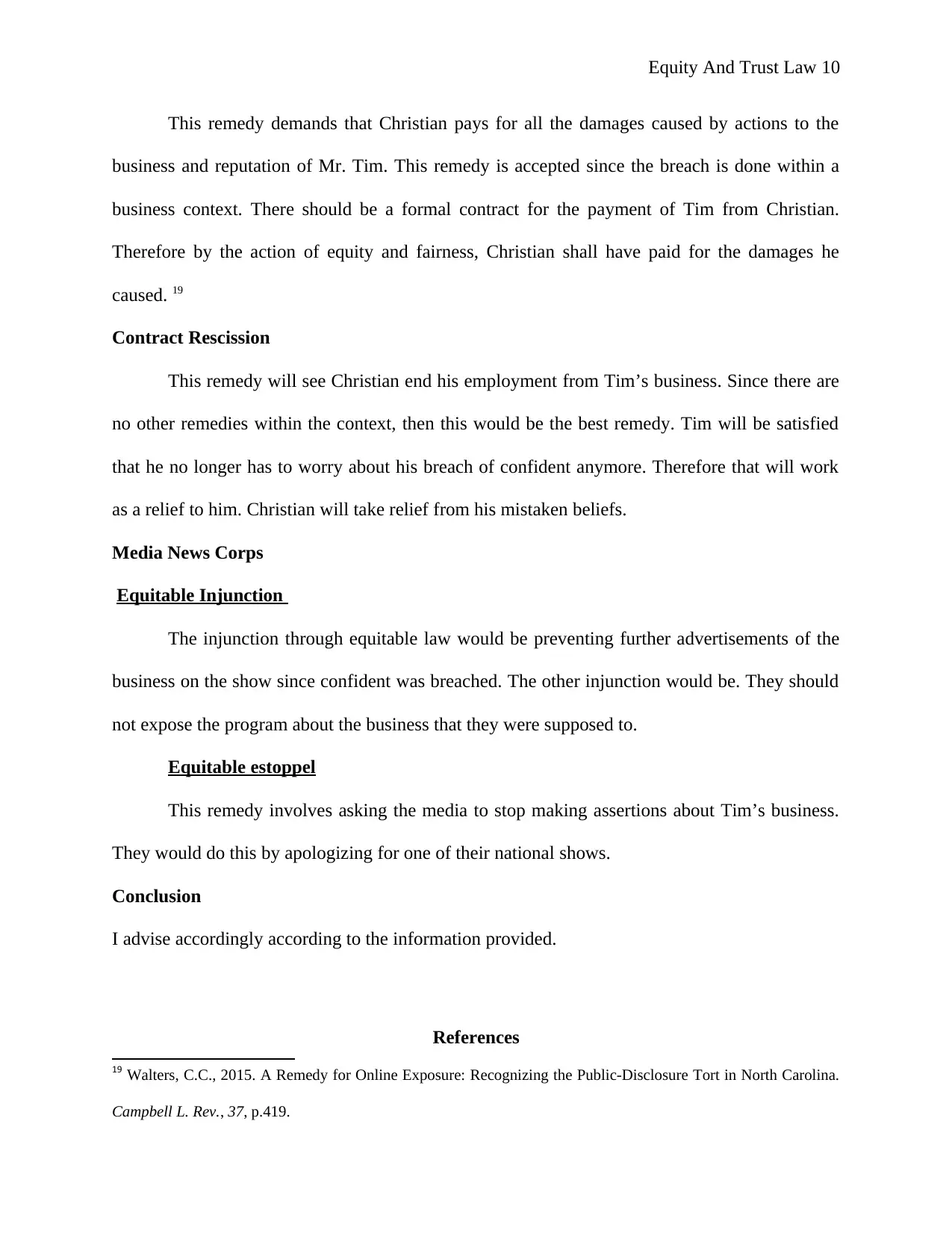
Equity And Trust Law 10
This remedy demands that Christian pays for all the damages caused by actions to the
business and reputation of Mr. Tim. This remedy is accepted since the breach is done within a
business context. There should be a formal contract for the payment of Tim from Christian.
Therefore by the action of equity and fairness, Christian shall have paid for the damages he
caused. 19
Contract Rescission
This remedy will see Christian end his employment from Tim’s business. Since there are
no other remedies within the context, then this would be the best remedy. Tim will be satisfied
that he no longer has to worry about his breach of confident anymore. Therefore that will work
as a relief to him. Christian will take relief from his mistaken beliefs.
Media News Corps
Equitable Injunction
The injunction through equitable law would be preventing further advertisements of the
business on the show since confident was breached. The other injunction would be. They should
not expose the program about the business that they were supposed to.
Equitable estoppel
This remedy involves asking the media to stop making assertions about Tim’s business.
They would do this by apologizing for one of their national shows.
Conclusion
I advise accordingly according to the information provided.
References
19 Walters, C.C., 2015. A Remedy for Online Exposure: Recognizing the Public-Disclosure Tort in North Carolina.
Campbell L. Rev., 37, p.419.
This remedy demands that Christian pays for all the damages caused by actions to the
business and reputation of Mr. Tim. This remedy is accepted since the breach is done within a
business context. There should be a formal contract for the payment of Tim from Christian.
Therefore by the action of equity and fairness, Christian shall have paid for the damages he
caused. 19
Contract Rescission
This remedy will see Christian end his employment from Tim’s business. Since there are
no other remedies within the context, then this would be the best remedy. Tim will be satisfied
that he no longer has to worry about his breach of confident anymore. Therefore that will work
as a relief to him. Christian will take relief from his mistaken beliefs.
Media News Corps
Equitable Injunction
The injunction through equitable law would be preventing further advertisements of the
business on the show since confident was breached. The other injunction would be. They should
not expose the program about the business that they were supposed to.
Equitable estoppel
This remedy involves asking the media to stop making assertions about Tim’s business.
They would do this by apologizing for one of their national shows.
Conclusion
I advise accordingly according to the information provided.
References
19 Walters, C.C., 2015. A Remedy for Online Exposure: Recognizing the Public-Disclosure Tort in North Carolina.
Campbell L. Rev., 37, p.419.
Paraphrase This Document
Need a fresh take? Get an instant paraphrase of this document with our AI Paraphraser
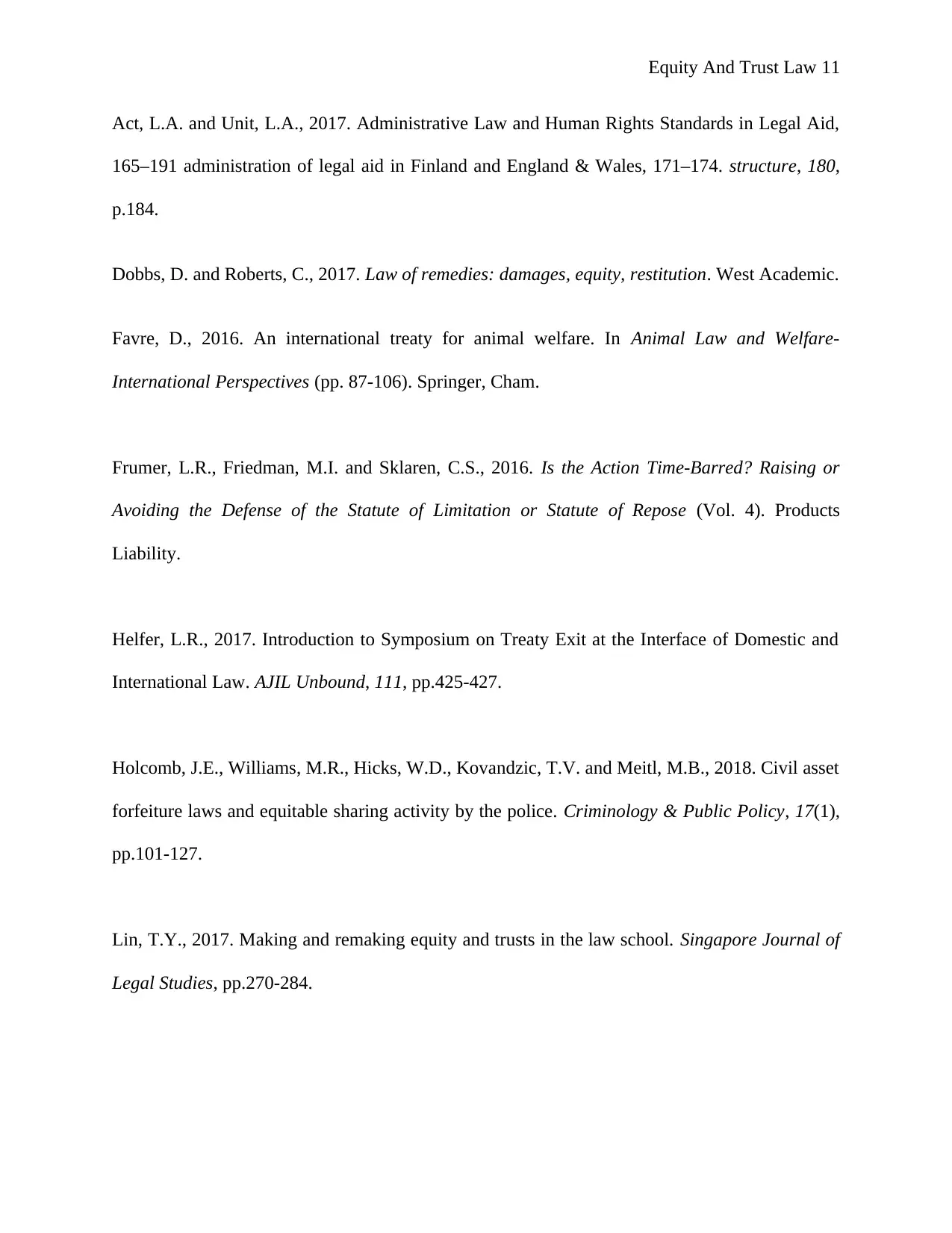
Equity And Trust Law 11
Act, L.A. and Unit, L.A., 2017. Administrative Law and Human Rights Standards in Legal Aid,
165–191 administration of legal aid in Finland and England & Wales, 171–174. structure, 180,
p.184.
Dobbs, D. and Roberts, C., 2017. Law of remedies: damages, equity, restitution. West Academic.
Favre, D., 2016. An international treaty for animal welfare. In Animal Law and Welfare-
International Perspectives (pp. 87-106). Springer, Cham.
Frumer, L.R., Friedman, M.I. and Sklaren, C.S., 2016. Is the Action Time-Barred? Raising or
Avoiding the Defense of the Statute of Limitation or Statute of Repose (Vol. 4). Products
Liability.
Helfer, L.R., 2017. Introduction to Symposium on Treaty Exit at the Interface of Domestic and
International Law. AJIL Unbound, 111, pp.425-427.
Holcomb, J.E., Williams, M.R., Hicks, W.D., Kovandzic, T.V. and Meitl, M.B., 2018. Civil asset
forfeiture laws and equitable sharing activity by the police. Criminology & Public Policy, 17(1),
pp.101-127.
Lin, T.Y., 2017. Making and remaking equity and trusts in the law school. Singapore Journal of
Legal Studies, pp.270-284.
Act, L.A. and Unit, L.A., 2017. Administrative Law and Human Rights Standards in Legal Aid,
165–191 administration of legal aid in Finland and England & Wales, 171–174. structure, 180,
p.184.
Dobbs, D. and Roberts, C., 2017. Law of remedies: damages, equity, restitution. West Academic.
Favre, D., 2016. An international treaty for animal welfare. In Animal Law and Welfare-
International Perspectives (pp. 87-106). Springer, Cham.
Frumer, L.R., Friedman, M.I. and Sklaren, C.S., 2016. Is the Action Time-Barred? Raising or
Avoiding the Defense of the Statute of Limitation or Statute of Repose (Vol. 4). Products
Liability.
Helfer, L.R., 2017. Introduction to Symposium on Treaty Exit at the Interface of Domestic and
International Law. AJIL Unbound, 111, pp.425-427.
Holcomb, J.E., Williams, M.R., Hicks, W.D., Kovandzic, T.V. and Meitl, M.B., 2018. Civil asset
forfeiture laws and equitable sharing activity by the police. Criminology & Public Policy, 17(1),
pp.101-127.
Lin, T.Y., 2017. Making and remaking equity and trusts in the law school. Singapore Journal of
Legal Studies, pp.270-284.
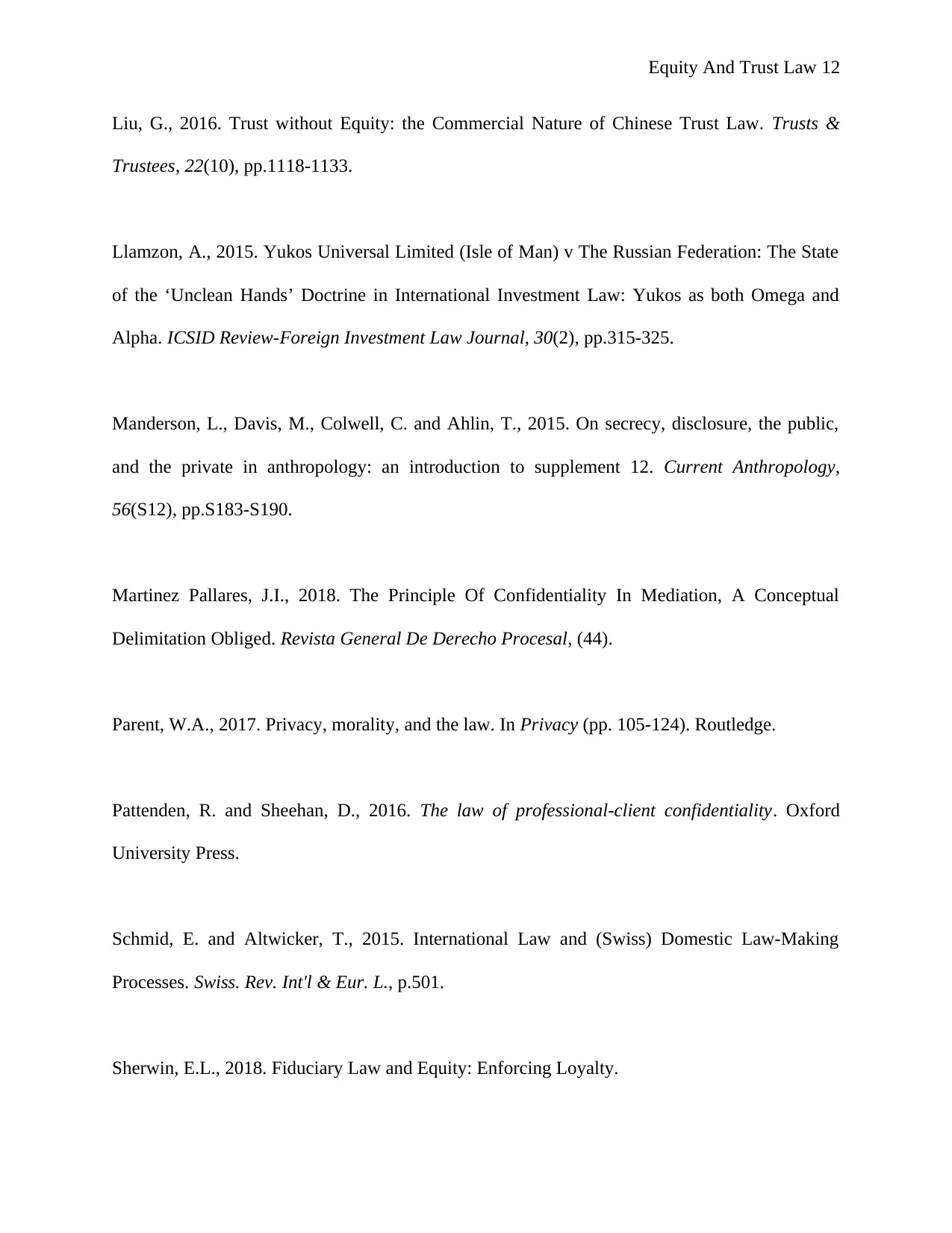
Equity And Trust Law 12
Liu, G., 2016. Trust without Equity: the Commercial Nature of Chinese Trust Law. Trusts &
Trustees, 22(10), pp.1118-1133.
Llamzon, A., 2015. Yukos Universal Limited (Isle of Man) v The Russian Federation: The State
of the ‘Unclean Hands’ Doctrine in International Investment Law: Yukos as both Omega and
Alpha. ICSID Review-Foreign Investment Law Journal, 30(2), pp.315-325.
Manderson, L., Davis, M., Colwell, C. and Ahlin, T., 2015. On secrecy, disclosure, the public,
and the private in anthropology: an introduction to supplement 12. Current Anthropology,
56(S12), pp.S183-S190.
Martinez Pallares, J.I., 2018. The Principle Of Confidentiality In Mediation, A Conceptual
Delimitation Obliged. Revista General De Derecho Procesal, (44).
Parent, W.A., 2017. Privacy, morality, and the law. In Privacy (pp. 105-124). Routledge.
Pattenden, R. and Sheehan, D., 2016. The law of professional-client confidentiality. Oxford
University Press.
Schmid, E. and Altwicker, T., 2015. International Law and (Swiss) Domestic Law-Making
Processes. Swiss. Rev. Int'l & Eur. L., p.501.
Sherwin, E.L., 2018. Fiduciary Law and Equity: Enforcing Loyalty.
Liu, G., 2016. Trust without Equity: the Commercial Nature of Chinese Trust Law. Trusts &
Trustees, 22(10), pp.1118-1133.
Llamzon, A., 2015. Yukos Universal Limited (Isle of Man) v The Russian Federation: The State
of the ‘Unclean Hands’ Doctrine in International Investment Law: Yukos as both Omega and
Alpha. ICSID Review-Foreign Investment Law Journal, 30(2), pp.315-325.
Manderson, L., Davis, M., Colwell, C. and Ahlin, T., 2015. On secrecy, disclosure, the public,
and the private in anthropology: an introduction to supplement 12. Current Anthropology,
56(S12), pp.S183-S190.
Martinez Pallares, J.I., 2018. The Principle Of Confidentiality In Mediation, A Conceptual
Delimitation Obliged. Revista General De Derecho Procesal, (44).
Parent, W.A., 2017. Privacy, morality, and the law. In Privacy (pp. 105-124). Routledge.
Pattenden, R. and Sheehan, D., 2016. The law of professional-client confidentiality. Oxford
University Press.
Schmid, E. and Altwicker, T., 2015. International Law and (Swiss) Domestic Law-Making
Processes. Swiss. Rev. Int'l & Eur. L., p.501.
Sherwin, E.L., 2018. Fiduciary Law and Equity: Enforcing Loyalty.
⊘ This is a preview!⊘
Do you want full access?
Subscribe today to unlock all pages.

Trusted by 1+ million students worldwide
1 out of 13
Your All-in-One AI-Powered Toolkit for Academic Success.
+13062052269
info@desklib.com
Available 24*7 on WhatsApp / Email
![[object Object]](/_next/static/media/star-bottom.7253800d.svg)
Unlock your academic potential
Copyright © 2020–2026 A2Z Services. All Rights Reserved. Developed and managed by ZUCOL.
